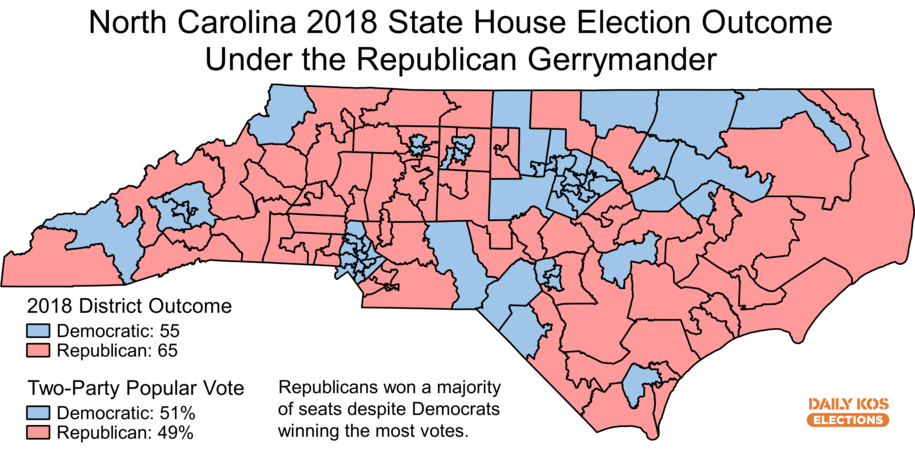In a 357-page decision, a unanimous three-judge panel on Tuesday ordered drawing of new legislative maps in North Carolina, ruling in Common Cause v. Lewis that the current maps constitute “extreme partisan gerrymandering” and violate three separate provisions of the state constitution.
“The 2017 Enacted Maps, as drawn, do not permit voters to freely choose their representative, but rather representatives are choosing voters based upon sophisticated partisan sorting,” the panel wrote. The two Democrats and one Republican declared the results reflect not the will of the people but the “will of the map drawer” in violation of the North Carolina constitution’s free elections and equal protection clauses, as well as its guarantees of freedom of speech and assembly.
Republicans drew their maps without Democratic input, but with the aid of Thomas B. Hofeller, the godfather of Republican gerrymandering efforts. Hofeller died in 2018.
Courts hearing challenges to both state and federal districts have grown exasperated with North Carolina Republicans’ evasiveness and delaying tactics. Since taking control of the legislature in 2011, Republicans have been forced repeatedly to defend their maps in court. Losing, they redrew them just narrowly enough pass muster. This time, they face court supervision.
The Charlotte Observer reports:
In Tuesday’s ruling, judges gave the legislature just two weeks, until Sept. 18, to draw new maps. Judges ruled the new lines can be drawn to protect incumbents from being pitted against one another but can’t use any other political data.
The judges also told lawmakers they might simply reschedule the elections in 2020 if the legislature can’t come up with new maps in time. “The Court retains jurisdiction to move the primary date for the General Assembly elections, or all of the State’s 2020 primaries, including for offices other than the General Assembly, should doing so become necessary to provide effective relief in this case,” the ruling says.
In the 5-4 Rucho v. Common Cause Supreme Court decision this summer, justices ruled federal courts could not invalidate maps based on partisan gerrymandering, although states might still do so. Wake County Superior Court judges did just that in this case where state law formed the basis for the judgment.
Republican Senate leader Phil Berger said he would not appeal, the ruling but would begin drawing new maps. But he found a way to blame the loss on former U.S. Attorney General Eric Holder who now heads the National Democratic Redistricting PAC:
“This case is the next step in Eric Holder’s drive to use judges to create a Democratic majority,” states the release from Senate President Pro Tem Phil Berger’s Office. “Thwarted at the U.S. Supreme Court, Holder has turned to state courts with Democratic majorities to, in his own words, ‘favorably position Democrats’ to game the redistricting process.”
Since Republicans took control of the legislature in 2011, perhaps the most harm has been to North Carolina voters unrepresented in illegally drawn districts and whipsawed by shifting district lines and mercurial changes to voting rules.
The current state-district maps were redrawn in 2017 after the U.S. Supreme Court affirmed a lower court’s ruling that they constituted an unconstitutional racial gerrymander. This will be the third time the state’s voters will see new state maps since 2011. Congressional maps in this decade have a similar history. (Without moving, this writer voted in NC-10 in the 2016 primary and in NC-11 in the general election.)
Appealing their latest loss to the North Carolina Supreme Court is a long shot for Republicans. Six Democrats and one Republican hold seats there. Plus, filing for 2020 races begins December 2, with the primary scheduled for March 3. Any delay will harm both Republican and Democratic candidates.
In handing down their ruling, the judges announced that they would immediately appoint a nonpartisan expert to assist them in reviewing any replacement maps to ensure they pass muster—or to draw maps of their own should the GOP’s efforts prove unconstitutional yet again.
Stephen Wolf writes at Daily Kos:
While this case only concerns the maps in one state, every state constitution has provisions similar to North Carolina’s that could be used to challenge partisan gerrymanders so long as there’s a receptive and fair-minded state Supreme Court majority to hear such a case. This ruling therefore underscores the importance of supreme court elections in key swing states next year, including Michigan, Ohio, and Wisconsin. Progressive victories in these races would go a long way toward blocking the GOP’s lopsided control over redistricting as we head into the next round of redistricting following the 2020 census.

Take note: The population data Republicans will use to redraw districts — again — is nearly 10 years old.
